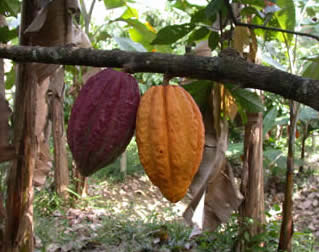Morphological Characterisation
Activities | Achievements | Staff
Morphological characterisation of cocoa germplasm began in 1990. In the early days, a large number of physical characters were used - as recommended by the IBPGR/IPGRI now Bioversity International. In 1996, the list of descriptors was reduced to 25.
The table below shows the 25 descriptors used for morphological characterisation, their states and sample sizes (n).
Descriptors for Morphological Characterisation
| Descriptor |
State |
Flower, anthocyanin intensity in column of pedicel |
1=green, 2=reddish, 3=red [n=10]. |
Flower, sepal length (mm) [n=10] |
|
Flower, anthocyanin intensity on ligule |
0=absent, 3=slight, 5=intermediate, 7=intense [n=10] |
Flower, ligule width (mm) [n=10] |
|
Flower, anthocyanin intensity in filament |
0=absent, 3=slight, 5=intermediate, 7=intense [n=10] |
Flower, style length (mm) [n=10] |
|
Flower, ovule number [n=10] |
|
Fruit, shape |
1= oblong, 2= elliptic, 3=obovate, 4= orbicular [n=10], 5= oblate or other (specified). |
Fruit, basal constriction |
0=absent, 1=slight, 2=intermediate, 3=strong, 4=wide shoulder [n=10] |
Fruit, apex form |
1=attenuate, 2=acute, 3=obtuse, 4=rounded, 5=mammillate, 6=indented [n=10] |
Fruit, surface texture (rugosity or degree of wartiness) |
0=absent, 3=slight, 5=intermediate, 7=intense [n=10] |
Fruit, anthocyanin intensity in mature ridges |
0=absent, 3=slight, 5=intermediate, 7=intense [n=10] |
Fruit, ridge disposition |
1=equidistant, 2=paired [n=10] |
Fruit, primary ridge separation |
1=slight, 2=intermediate, 3=wide [n=10] |
Fruit, pod wall hardness [n=10] |
3= ≤ 1.6 MPa, 5 = > 1.6 MPa ≤ 2.0 MPa, 7= > 2.0 MPa |
Fruit, length (cm) [n=10] |
|
Fruit, width (cm) [n=10] |
|
Seed, number [n=10] |
|
Seed, shape |
1=oblong 2=elliptic 3=ovate |
Seed, cotyledon colour |
1=white, 2=grey, 3=light purple, 4=medium purple, 5=dark purple, 6=mottled [n=40] |
Wet bean weight (total) (g) [n=10] |
|
Cotyledon length (cm) [n=20]. |
|
Cotyledon width (cm) [n=20]. |
|
Cotyledon weight (g) [n=20] |
|
Pod index [n=10] |
Methods as outlined in Anon. (1981) Genetic resources of cocoa. (AGP: IBPGR/80/56) IBPGR Working Group on genetic resources of cocoa. Rome: IBPGR Secretariat, 25pp.
Major outputs
- Descriptor list info stored in International Cocoa Germplasm Database.
- Manuals
- Field Guide to the ICS Clones of Trinidad
- Cacao Clones Manual
View Achievements page for further outputs.
Farmers, students and the public are welcome to visit CRC to learn more about morphological characterisation of cacao genotypes and their phenotypic diversity.
Background
To exploit the full value of the International Cocoa Genebank, Trinidad (ICG,T), each accession must be characterised. Morphological characterisation provides information for the identification of accessions and to recognise important traits related to economic yield and potential constraints to yield.

The data generated also assist in the detection of duplicates or mislabelled accessions within the ICG,T. The relatively slow progress in the genetic improvement of cacao in the past has been due to the long generation cycle of cacao, limited resources, and a narrow genetic base for breeding programmes.
Judicial use of data from Cocoa Research Centre's characterisation studies will allow selection of genotypes for future breeding/germplasm enhancement programmes which consider genetic diversity, bean size, and pod index (as an indicator of yield potential) in addition to other traits quantified in evaluation studies as demonstrated here.

















